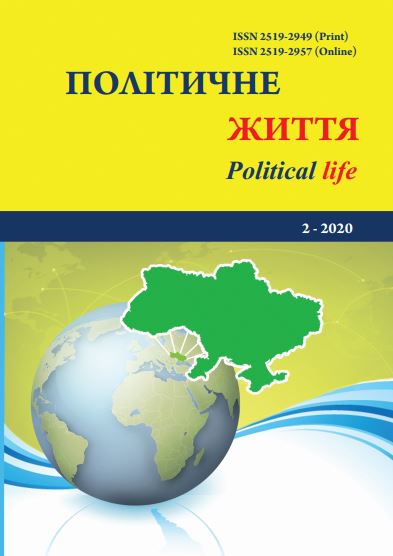Preconditions and institutionalization of the relationship between the government and the opposition in the countries of Central and Eastern Europe (on the example of the Visegrad Group countries): experience for Ukraine.
DOI:
https://doi.org/10.31558/2519-2949.2020.2.2Keywords:
political opposition, Visegrad Group, democracy, parliamentary opposition, political crisisAbstract
The experience and evolution of the countries of Central and Eastern Europe, the multivariate ways and results of democratic transformations are analyzed. A number of common characteristics and landmark goals at the beginning of the transformation were taken into account, stating that not all countries in the region had positive dynamics and a linear transit path, not all reached the level of consolidated democracy and not all consolidated democracies fully realized their potential.
The significance and peculiarities of the political opposition in the processes of structuring and institutionalization of the political regimes of the Visegrad Group countries are outlined. The influence of political opposition and protest on the transformation from autocratic to democratic regimes is noted. The evolution and interrelation of models of democratic transit from a pre-institutional phenomenon (socio-political protests) to an institutional phenomenon (in the form of a political institution) are traced, and the institutional factors that contributed to reducing the level of conflict potential in the process of democratic transition are clarified.
Significance is given to political practice and the experience of the Visegrad Group countries is taken into account for the analysis of political processes, political crisis and confrontation between the government and the opposition, especially within the parliament in modern Ukraine. It is considered to be the best example of a study of coalition governments in the period of political transformation and in the period after the accession of these countries to the EU, which can be valuable empirical material for further political development of Ukraine and its political institutions. It is established that the main condition for the formation of a consolidated democracy is the process of constructivization of the political opposition.References
Кольцов В. Особливості та значення політичної опозиції у структуризації та інституціоналізації політичних режимів країн Вишеградської групи (1989-2017): порівняльний аналіз. Вісник Львівського університету. Серія філос.-політолог. Студії. 2017. Вип. 14. С.140-149
Політична влада і опозиція в Україні: порівняльний аналіз із зарубіжними країнами / за заг. ред.
Ф.М. Рудича. К.: ІПіЕНД ім. І.Ф. Кураса НАН України.-2016. 488 с.
Політичні трансформації у країнах Центральної Європи наприкінці ХХ – на початку ХХІ століть: Навчальний посібник / Упоряд. М.Лендьел. Ужгород: Поліграф центр «Ліра», 2016. – 464с.
Зеленько Г. І. Передумови формування конструктивної опозиції в країнах Вишеградської групи. Наукові записки Інституту політичних і етнонаціональних досліджень ім. І. Ф. Кураса НАН України. 2015. Вип. 2. С. 64-84.
Трансформаційні процеси у країнах Вишеградської групи та Україні: порівняльний аналіз
/ за ред. проф. Г. М. Перепелиці. К. : Видавничий дім «Стилос», 2013. 302 с.
Бокало Н., Трохимчук С. Проблеми і перспективи демократизації в країнах Центрально-Східної Європи (на прикладі країн Вишеградської групи). Львів, 2000. 68 с.
Степанова Н. Конфліктна взаємодія суб’єктів української політики: нові умови, нові правила, нові підходи до вивчення. Дослідження політичної взаємодії в умовах трансформації суспільства: зб. наук. праць. Одеса: Одеський нац. ун-т ім. Мечникова, 2013. С.201-222.
Бусленко В. Конфліктний характер взаємовідносин між владою та опозицією в Україні: причини та політичні наслідки. Studia Politologica Ucraino-Polona. Вип. 5. Житомир-Київ-Краків, 2015. C.321.

